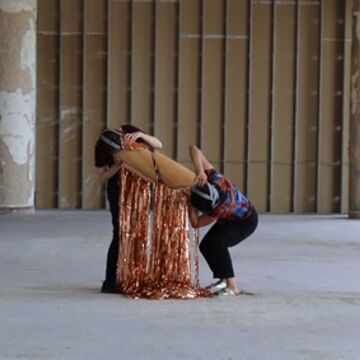|
Description
A class to develop games and immersive media experiences that reflect your creative voice. Over 15 weeks, ¿Intro to Games and Immersive Media¿ introduces a broad range of analog and digital game design techniques spanning from table top to virtual reality games. This course introduces students to game-making as a form of artistic practice, teaching foundational techniques and tools to develop analog and digital games that reflect their own creative voice and vision. No previous game-making skills are required, but students with an interest in games, or augmented and virtual reality technologies, will be guided through aesthetic and technical foundations in various aspects of game design and immersive media.
By the end of the semester, students will have created complete games or immersive media artworks ready to present in their portfolio.
Readings and screenings will vary but typically include Mary Flanagan, Eric
Zimmerman and Katie Salen Tekinbas.
Course work will vary but typically includes weekly reading responses, a mid-term, and a group final project. Students can expect to complete several exercises that explore a number of gaming media including working with game engines such as Unity or Unreal, character development and animation and motion capture. Students will complete a final culminating project in the form of a game or immersive media artwork.
|
Class Number
2268
Credits
3
|
|
Description
This course approaches the tools provided by game engines as an experimental sound studio capable of creating new kinds of digital audio works for un-fixed media. Procedural audio tools can lead to endlessly evolving sound compositions and generative music; interactivity can empower navigability through sonic worlds, virtual sound installations, or the creation of new instruments; physics simulations can allow for real, hyperreal, and unreal audio environments for listeners, viewers, and gamers. Starting from the first day with the download of a game engine and a digital audio workstation and ending on the last with the critique of a sound-focused work, this class will provide a thorough introduction to authoring sound-focused art experiences using game engines.
Some of the scholars/artists we will study in this course include Janet Cardiff & George Bures Miller¿s audio walks, Peter Gena, Poppy Crum, Brian Eno and Peter Chilvers among others. Of particular interest are works that explore the use of real time, interactive, and emergent systems that critically address the ways that sound, action, and presence shape the experience of listening bodies.
Screening may include virtual reality works such as Notes on Blindness by Colinart, La Burthe, and Middleton and Spinney or spatial audio experiences such as Scott Reitheman¿s Boom App.
Through weekly assignments and class studio time, we will focus first on building technical skills and developing some historical context related to game engine development, digital audio production, spatial hearing and spatial audio approaches, and real time motion tracking and interaction. Individual projects for formal class critiques will be proposed by students and may take the form of music composition, virtual sound installation, video game or VR sound design, new sonics forms, etc.
|
Class Number
2116
Credits
3
|
|
Description
This seminar introduces topics, theories, strategies, and histories fundamental to the two complementary areas of Art + Technology / Sound Practices (AT/SP). Designed as an immersion into the department's intertwined legacies and curriculum, it is intended for first-year AT/SP graduate students, but open to all in the Graduate Program. The seminar is taught by two faculty who represent the AT and SP areas, each providing a focused approach in small-group settings.
Art + Technology: Hito Steyrel, Kelly Pendergrast, Jenny Odell, Wendy Chun, Antonio Negri, Raqs Media Collective, Olia Lialina,Trevor Paglan, Olia Lialina, Rafael Lozanno Hemmer, Micha Cardenas, Harun Farocki, Liam Gillick, Ian Cheng, Casey Reas, Auria Harvey, Stephanie Dinkins.
Sound: Samson Young, Mendi + Keith Obadike, Alvin Lucier, Eliane Radigue, Laetitia Sonami, Imai Norio, Christina Kubisch, Pamela Z, Cauleen Smith, Christoph Cox, George E. Lewis, Seth Kim-Cohen, Julia Eckhardt, Pierre Schaeffer, Jean-Luc Nancy, Joseph Grigely, Dylan Robinson.
Weekly readings and discussions are required, as well as informed responses to artists¿ works presented. students will present work for critique and fully particpate in critique sessions.
|
Class Number
2381
Credits
3
|

